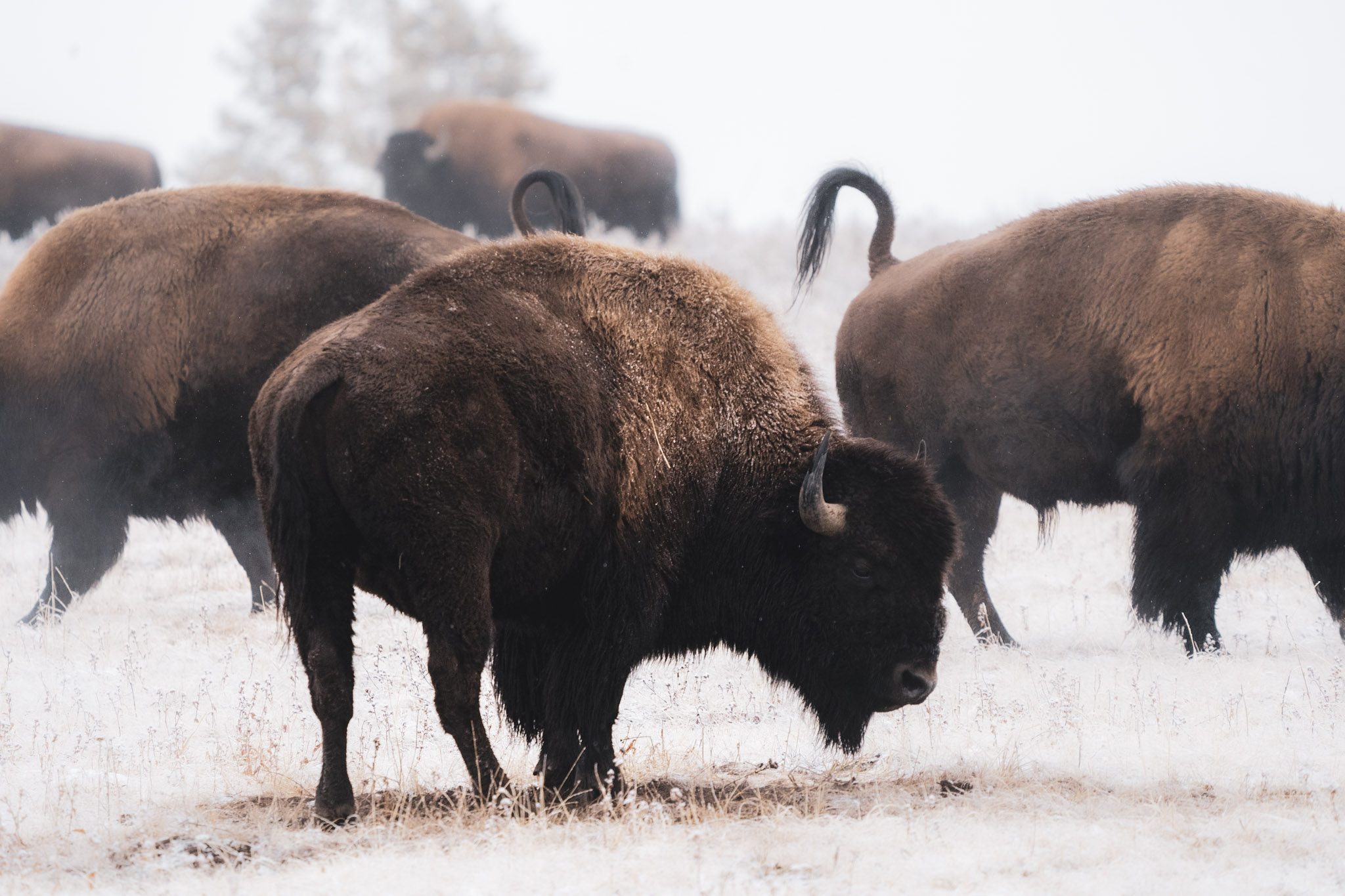
- Details
- By Elyse Wild
Bison and grassland ecosystem restoration efforts in Tribal communities are getting a $1.5 million boost from the federal government.
The funding was announced today by the Department of the Interior’s Office of the Assistant Secretary for Indian Affairs and pulled from President Biden’s Investing in America agenda.
The funding will be divided between three Tribal-led initiatives that aim to strengthen bison conservation and expansion, improved management of existing herds, and ecosystem restoration efforts in native grassland habitats.
Bison are a keystone species that plays a crucial role in maintaining the ecological balance of diverse landscapes while also supporting economic development and Indigenous food sovereignty and security. The projects will focus on habitat restoration, genetic diversity preservation, and the expansion of bison populations in collaboration with Indigenous communities utilizing Indigenous Knowledge.
“Bison are vitally important culturally, economically, and ecologically. These investments from the President’s Investing in America agenda support our efforts to revitalize Tribal cultures and communities and help conserve and restore important ecosystems that benefit all Americans,” said Assistant Secretary for Indian Affairs Bryan Newland in a statement. “This exemplifies the Biden-Harris administration’s dedication to building a more resilient and sustainable future for Tribal nations and all Americans.”
The funding, provided through the Bipartisan Infrastructure Law, is part of the Department’s Grasslands Keystone Initiative, unveiled as part of a Restoration and Resilience Framework that is guiding $2 billion in investments from the Bipartisan Infrastructure Law and Inflation Reduction Act to restore lands and waters and advance climate resilience. The Framework also includes a commitment to restoring core sagebrush areas across the Western States and into Alaska, where bison once thrived.
Bison populations in the United States once numbered upwards of 60 million. In the mid-1800s, a federally sanctioned campaign to eradicate the species took hold, and in just 20 years, from 1870 to 1890, there remained just 500 buffalo. The devastating slaughter was driven by efforts to eradicate Native American populations, who relied on the bison for bison for food, clothing, shelter, tools, and weapons.
The near eradication of bison led to the decline of healthy grassland ecosystems and, eventually, to the Dust Bowl in the 1930s
Thanks to conservation efforts, the buffalo population is slowly climbing, sitting at around 31,000.
Bison heard expansion projects awarded portions of the funds include:
- Cheyenne and Arapaho Tribes, Oklahoma: The project aims to enhance the existing bison herd of around 650 by doubling the pasture area on Tribal lands, addressing infrastructure needs, and incorporating climate-smart practices. The project will increase herd size, improve ecosystem health, and explore a market for bison products, resulting in ecological restoration, cultural preservation, and economic development in Northwest Oklahoma.
- Three Affiliated Tribes of the Fort Berthold Reservation, North Dakota: The project focuses on expanding the Twin Buttes Hans Creek bison range by building a 10,000-acre pasture on Tribal lands to support the expansion of the existing 250-head bison herd. Expansion would allow an increase in capacity of up to 4,000 bison. The program, rooted in Indigenous values, seeks ecological restoration by rewilding, acknowledging the critical role of large-scale bison herds in maintaining ecosystem health. Indian Affairs will provide funding for fencing materials to complete the pasture expansion, supporting the spiritual and cultural beliefs of the Nueta while also supporting sustainable bison management practices.
- Shoshone-Bannock Tribes of the Fort Hall Reservation, Idaho: The project seeks to reintroduce buffalo on traditional grazing lands, enhancing food and economic sovereignty for the Shoshone-Bannock Tribes. With a current buffalo count of 465, the project aims to expand the herd to 1,100 by introducing additional buffalo and fostering cultural significance, employment opportunities, and economic gain. The project aligns with the goals of environmental resilience and mitigating climate change impacts through soil health management. Indian Affairs funding will support infrastructure for animal control, management, and public safety by repairing or replacing fencing and watering systems.
More Stories Like This
Gwich'in Tribal Governments Submit Comments Challenging Fish and Wildlife Service's Inadequate Environmental Review of Arctic Refuge Snow RoadRappahannock Tribe Challenges 9M-Gallon Water Plan
Feds release draft long-term plans for Colorado River management
Apache Leader Walks 60 Miles to Court Hearing That Will Decide Fate of Sacred Oak Flat
Rappahannock Tribe Raises Sovereignty and Environmental Concerns Over Caroline County Water Permit
Help us defend tribal sovereignty.
At Native News Online, our mission is rooted in telling the stories that strengthen sovereignty and uplift Indigenous voices — not just at year’s end, but every single day.
Because of your generosity last year, we were able to keep our reporters on the ground in tribal communities, at national gatherings and in the halls of Congress — covering the issues that matter most to Indian Country: sovereignty, culture, education, health and economic opportunity.
That support sustained us through a tough year in 2025. Now, as we look to the year ahead, we need your help right now to ensure warrior journalism remains strong — reporting that defends tribal sovereignty, amplifies Native truth, and holds power accountable.
 The stakes couldn't be higher. Your support keeps Native voices heard, Native stories told and Native sovereignty defended.
The stakes couldn't be higher. Your support keeps Native voices heard, Native stories told and Native sovereignty defended.
Stand with Warrior Journalism today.
Levi Rickert (Potawatomi), Editor & Publisher


